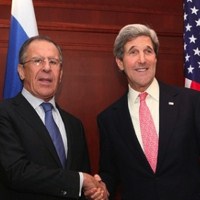John Kerry undertook his maiden voyage to Moscow as U.S. secretary of state this week, and the initial impression is that his visit was a success. There was a perceptible thaw in what, over the past year, has been described as a much more contentious relationship. U.S. officials have focused on the prospect of a "more intensified dialogue with the Russians" that can now take place in the aftermath of the presidential elections in both Russia and the United States.
Building upon the foundation laid last month by National Security Adviser Tom Donilon, Kerry continued the process of leaving behind the baggage that had accumulated between Moscow and Washington during the last part of the first term of the Obama administration, particularly over human rights issues. The United States can no longer rely on a close president-to-president relationship; in all of their encounters so far, Presidents Barack Obama and Vladimir Putin have been formally correct but not particularly close. For a "de-personalized" U.S.-Russia relationship to work, it must move away from personalities to focus on issues, while avoiding the many landmines that still litter the landscape—notably continued differences over the state of democracy and human rights in Russia.
Donilon and Kerry, in their visits to Moscow and their meetings with Putin, have spearheaded a fresh start in U.S.-Russia relations, one that, while acknowledging the "values gap" between the two countries, seeks not to be dominated by it. The Obama administration proceeded to sanction a number of Russian officials under the provisions of the Magnitsky Act—drawing the ire of the Kremlin—but far fewer than the several hundred that were predicted, suggesting that the U.S. government will bring up human rights issues but not make them the centerpiece of the relationship. With the Obama administration anxious for a smooth disengagement from Afghanistan, the importance of maintaining the northern supply route through Central Asia has trumped unnecessarily irritating Moscow. The aftermath of the Boston Marathon bombing has also re-awakened interest in increasing counterterrorism cooperation, even if it means accepting Russia's "democracy deficit." The Kremlin, for its part, may be moving to a grudging acceptance that tolerating the U.S. need to raise "values issues" is part of the price for maintaining a more normal relationship.

